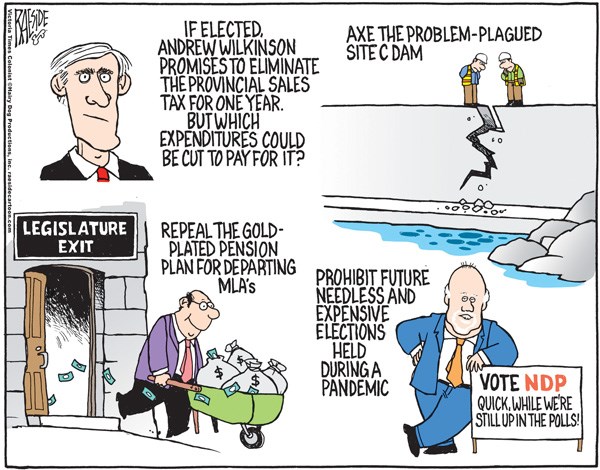Never underestimate the power of voter self-interest. The NDP didn’t in 2017 when their bold pledge to remove the tolls on the Port Mann and Golden Ears bridges helped them win enough suburban Vancouver seats to form a minority government. Now the B.C. Liberals are betting on an even bigger giveaway – cutting the seven per cent provincial sales tax to zero for one year and then re-introducing it at three per cent for at least another year.
“Eliminating PST puts more money in people’s pockets, stimulates growth for struggling small business, and helps British Columbians who are struggling to get by. This is a vital step to rebuild our economy,” Liberal Leader Andrew Wilkinson said Monday when the party rolled out the plan, calling it “an unprecedented tax cut for an unprecedented time.”
Others are calling it a desperate ploy by a party whose leader has failed to click with the voting public. It’s also been slammed because it would add billions to the deficit – almost $7 billion in year one, the Liberals calculate – and would not be targeting aid to the most vulnerable.
But there is some desperation in those arguments as well.
Government budgets have already been blown on targeted programs, with more promised every day, yet there are workers who have not been eligible for one penny of emergency relief, even though they have had to absorb pay cuts or reduced hours and will be taxed for years to come to pay off the deficits of 2020 and beyond. For them, not paying the PST for a year, and paying significantly less thereafter, would be the only tangible benefit they could expect to see from all this deficit spending.
As well, the PST is described as a regressive tax that hits lower income people the hardest, eating up a bigger portion of their disposable income.
All things considered, axing the PST can easily be seen as justifiable in the middle of a pandemic. In fact, it’s a good idea.
But that doesn’t mean it will have the same energizing effect on the Liberal campaign that the more modest bridge toll cut had for the NDP in 2017. At that time, the Liberals were past their best-before date and the NDP’s appeal to self-interest was icing on the cake for voters who needed a last little nudge in their direction. The dynamics are altogether different this time around.
If nothing else, the PST promise should make the Liberals more competitive and that fact alone is bound to give the NDP brain trust a few sleepless nights.


